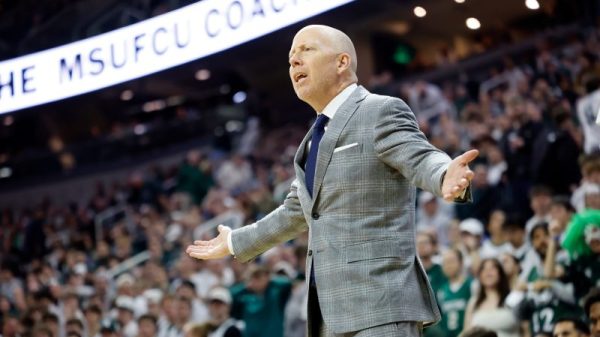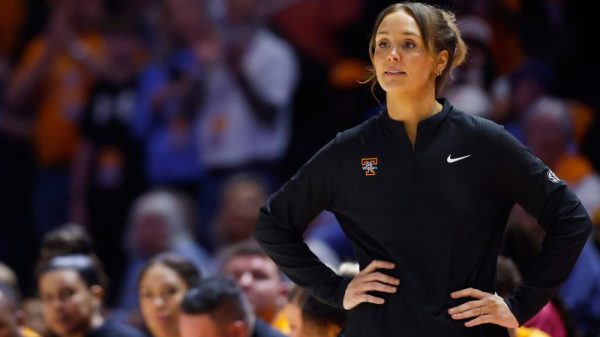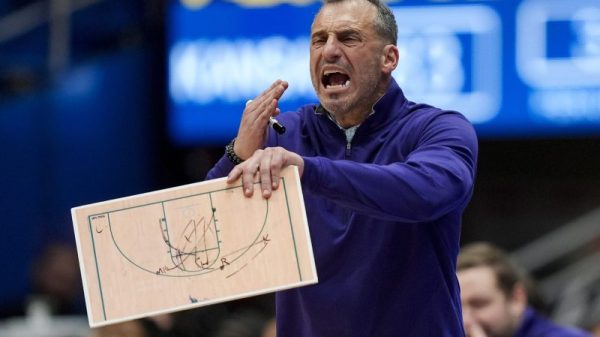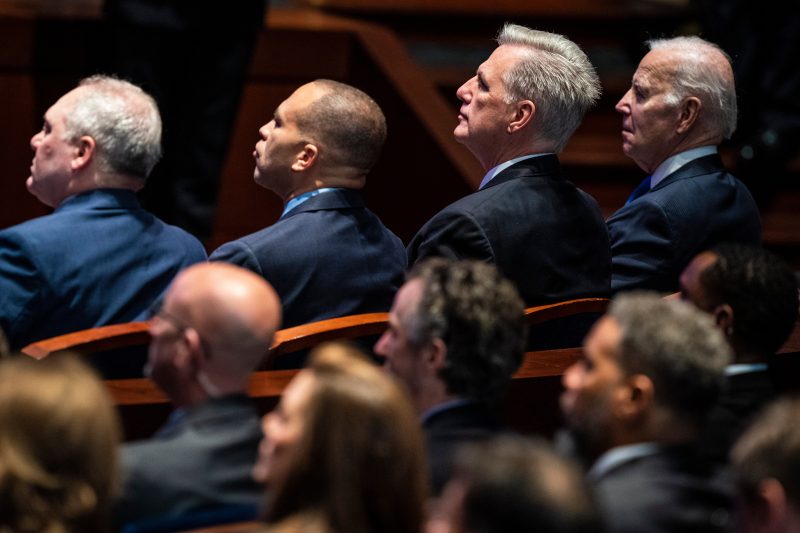Minority Leader Hakeem Jeffries (D-N.Y.) is known for his calm demeanor, using his words rather than a booming voice to land a rhetorical punch. But at a news conference last month, his voice rose, uncharacteristically, as he condemned House Speaker Kevin McCarthy (R-Calif.) for supporting the removal of three Democrats from their committees.
“This type of poisonous, toxic double standard is going to complicate the relationship moving forward between House Democrats and House Republicans,” Jeffries predicted, just hours before House Republicans voted to remove Rep. Ilhan Omar (D-Minn.) from the Foreign Affairs Committee. McCarthy, for his part, was unmoved.
But in the days that followed, the newly minted speaker privately approached Jeffries with a request: He wanted the Democratic leader to join him in speaking to the House Intelligence Committee.
The committee had devolved over the past several years, as Democrats and Republicans traded barbs during President Donald Trump’s tenure. And McCarthy had used that history as part of his justification in unilaterally kicking California Democrats Adam B. Schiff and Eric Swalwell off the panel — retribution for the two Republicans removed from their committees for their extremist remarks under Speaker Nancy Pelosi (D-Calif.) in the last Congress. McCarthy wanted Jeffries to join him in stressing to lawmakers on the high-profile committee that their edict was not to jab, but to serve.
Jeffries agreed, and in early February, the two leaders with vastly different backgrounds and belief systems, addressed the lawmakers during a meeting in the secure room where the committee regularly receives classified briefings, details of which have not previously been reported. Afterward, Chairman Michael R. Turner (R-Ohio) and ranking Democrat Jim Himes (Conn.) followed suit, telling the newly formed panel “that we were going to work on a bipartisan basis,” Turner said.
McCarthy and Jeffries have been driven to establish a truce of sorts this year, working to maintain a cordial relationship out of respect for the House as a functioning institution, according to nearly a dozen close confidants and lawmakers, some of whom spoke on the condition of anonymity to discuss the relationship candidly. The rough start of the congressional term has since given way to a series of olive branches.
But the nascent relationship will be tested by the imminent, and already partisan, fight over the debt ceiling and government funding later this year. Both men have foreshadowed the clash, with Jeffries blasting “the irresponsible effort by extreme MAGA Republicans” to hold the economy hostage, and McCarthy blaming Democrats for exploding the debt and refusing to negotiate.
“There’s times we argue,” McCarthy said in an interview. “But that doesn’t mean I shouldn’t talk to him as minority leader.”
McCarthy’s outreach to Jeffries was driven by the lessons of his own tumultuous relationship with Speaker Pelosi during his time in as minority leader. Pelosi told The Washington Post she does not consider McCarthy her successor and that she never formed a bond with him. But any sliver of decorum between the two offices was shattered after Jan. 6, which also eroded most relationships between the parties.
“What I decided was, I’m going to treat [Jeffries] the way I wanted to be treated,” McCarthy said.
Jeffries, who aides and lawmakers have said is moving forward cautiously, sees few downsides in having an open line of communication with the speaker, ensuring he has input in key decisions.
“We’ve continued to have forward-looking conversations in a cordial way. We’re going to agree to disagree on a whole host of issues, including the release — recklessly — of video footage to Tucker Carlson,” Jeffries said in a brief interview. “But at the same time, we have a responsibility to find common ground in the best interests of the institution and the American people whenever possible.”
McCarthy said he wants the Intelligence Committee to take a class on artificial intelligence together, and he wants to go on official congressional trips, known as CODELs, with Jeffries in a continued sign of solidarity outside of Capitol Hill. McCarthy also has included Jeffries in security briefings, including one before the release of the video showing Tyre Nichols getting severely beaten by Memphis police before later dying. People close to McCarthy say his attempt at outreach comes from knowing how powerless the House minority leader can feel.
But regaining full trust between the parties may prove difficult as the cloud of the Jan. 6, 2021, attack on the U.S. Capitol still hangs over the House. That mistrust is likely to rebound since McCarthy gave Fox News host Tucker Carlson exclusive access to all security-camera footage from that day. Carlson later broadcast some of that footage in a way that severely downplayed the day’s deadly violence. And some Democrats believe McCarthy’s overtures are a political play as he barrels toward budget battles, where he may need Democratic votes, before facing an electorate in 2024 that has largely rejected right-wing extremism.
Though the two leaders now share the common goal of preserving the institution, their relationship was virtually nonexistent several months ago. Jeffries often told reporters he knew Majority Leader Steve Scalise (R-La.) much better than McCarthy, while the incoming speaker told people he believed Jeffries’s frequent attacks against him were no more than a political move to elevate himself.
Under Pelosi, Jeffries would refer to McCarthy as “Kevin” and an “extreme MAGA Republican.” Now, he sidesteps direct attacks against McCarthy personally and instead critiques the Republican Party as a whole. Pressed on whether he believes McCarthy is an “extreme MAGA Republican” at a news conference earlier this month, Jeffries skirted the question, simply noting that group is currently “in control” of the House.
Given the virtually nonexistent relationship between Pelosi and McCarthy, that the current top leaders are on speaking terms is significant. McCarthy and Jeffries frequently circumvent staff and text each other directly, a rarity in a formal workplace where writing letters and maneuvering through staff is still the norm. They also meet in a room off the House floor nearly weekly.
A person close to McCarthy said there is no “political strategy” to his outreach, emphasizing that his motive is “about the quality of the House.”
But as the top leaders of their party conferences, both McCarthy and Jeffries care about their legacy.
“I think they both have a broader set of interests than just the narrow partisan talking points or rhetoric,” said Rep. Patrick T. McHenry (R-N.C.), who is one of McCarthy’s closest friends in Congress. “It could go both ways.”
McCarthy first reached out to Jeffries shortly after the New York Democrat was elected minority leader in a closed-door caucus vote in November 2022. Before McCarthy endured a grueling 15 rounds of ballots to be elected speaker in January, he gave Jeffries a courtesy heads-up that his election might not be over after the first round and to “buckle up” because his intention was to fight until he earned the top slot.
Once McCarthy clinched the speakership, Jeffries made clear in his first address to the House that Democrats “do extend our hand of partnership” to the GOP majority, but also that they would “never compromise our principles” and push back against extremism.
McCarthy also addressed Jeffries immediately in his first speech to the House, promising that their “debates will be passionate, but they will never be personal. That’s my commitment to you.”
The void between Pelosi and McCarthy created room for a “cordial” relationship to form between then-Majority Leader Steny H. Hoyer (D-Md.) and the top Republican leader, who often gave McCarthy courtesy alerts about what a Democratic majority was planning. Hoyer said he witnessed McCarthy change to reach his objective to become speaker, leading to more disagreements over the extent to which McCarthy began to appease the Trump base.
“I think he adjusted. But then again, I think that’s what we all do in life,” Hoyer said. “You know, circumstances change, we try to accommodate.”
“McCarthy, first of all, wants to be perceived as a pleasant person, unlike some Republicans who want to be perceived as nasty,” Hoyer continued. “That’s McCarthy’s M.O., and I accepted that.”
Besides jointly addressing Intelligence Committee members, McCarthy and Jeffries agreed to put members on the select committee on China who are knowledgeable and focused on the issue, not firebrands with little policy acumen. On Tuesday, the leaders gathered the committee members in McCarthy’s office for a half-hour to commend the panel’s first hearing and encourage lawmakers to continue taking their assignments seriously.
“It was powerful. All the members were enthusiastic about it,” Chairman Mike Gallagher (R-Wis.) said. “I think there’s a recognition we’re not going to agree on everything, but that encouragement is enough to try.”
After the tit for tat of removing members from the opposite party from committees, McCarthy promised Reps. Ken Buck (R-Colo.) and Nancy Mace (R-S.C.) that they could work to find a solution that ensures such a practice does not become common. Jeffries signed off on the idea of creating a bipartisan group of members to determine what grounds would constitute removing lawmakers from committees.
Pelosi had a deal with GOP Speakers John A. Boehner (Ohio) and Paul D. Ryan (Wis.) to not intervene in each others’ conference dynamics. It’s unclear if Jeffries and McCarthy have since established a similar precedent, but the formation of the group serves as an indication of goodwill.
“It’s really important to me to do this in a nonpartisan way,” Mace said.
On Wednesday, both leaders led an all-member briefing with the Congressional Budget Office so both parties could receive the same set of facts on the debt limit before debates heat up. McCarthy, who initially planned the briefing for his conference alone, extended the invite to Jeffries and all Democrats.
“I talked to him ahead of time when I want to bring CBO because I didn’t want him to view it that, ‘oh, you’re playing some political game,’” McCarthy said. “I want us all to know the same numbers. We can argue about which way to solve it. But I want us to do it together.”
In the meeting, McCarthy offered a similar sentiment, according to aides and lawmakers present. McCarthy introduced Jeffries, asking if he likes to be called minority leader or Democratic leader, with McCarthy adding he himself didn’t like to be called minority leader. “I’ll just call you Hakeem,” McCarthy concluded.
“It was the least controversial briefing I’ve ever done in that room,” another Democratic member who attended said, noting that the room where the meeting was conducted is usually for classified briefings, which can get contentious. “We’ve never had a joint briefing on any issue that isn’t classified, so this is a new paradigm that McCarthy has proposed.”
Members across both party conferences, from Rep. Cori Bush (D-Mo.) to Rep. Marjorie Taylor Greene (R-Ga.), expressed positivity over the goodwill that Jeffries and McCarthy have fostered and hoped it continued for the sake of the institution.
“I mean, they have to be able to work together in some way, you know, but as long as our priorities and our agenda stays our agenda, I expect for Jeffries to have conversations with McCarthy,” Bush said.
Greene, who was removed from her committees in the last Congress, echoed the sentiment, noting, “I’m happy that the lines of communication are open. I think that’s good for everybody, especially the American people that we serve, so I hope to see more of it.”
Rep. Daniel Kildee (D-Mich.), however, injected a dose of Capitol Hill realism.
“We agree where we can and when we don’t, you know, we roll up our sleeves and slug it out,” Kildee said. “I think when you’re in the minority, you model the kind of behavior that you hope to see when you’re in the majority, and so in 22 months, we expect Leader McCarthy to treat Speaker Jeffries the same way.”
Paul Kane contributed to this report.



























